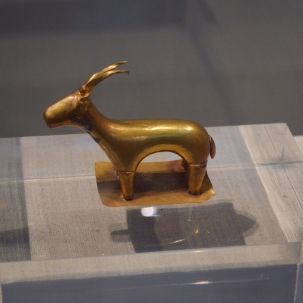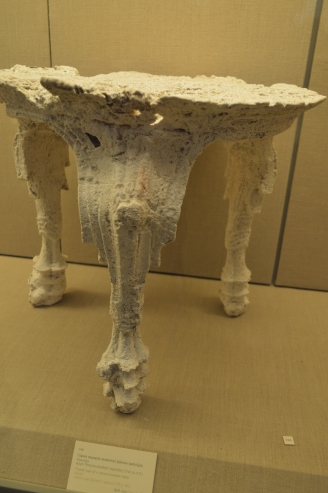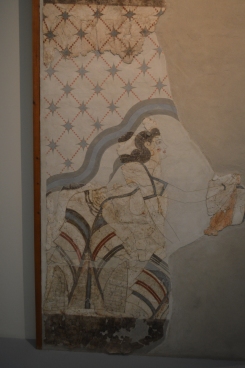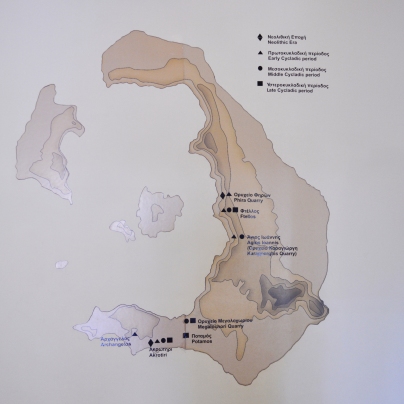
In 360 BC, approximately 1,300 years after the massive eruption of the island Thera, the Greek philosopher Plato wrote in his Timaeus of a great sea power that had attacked ancient Athens. He wrote that this sea power was the greatest power that the world had ever seen. These invaders, he wrote came from a giant island beyond “the Pillars of Hercules” which he called Atlantis. In his story Athens repealed the attack, the story ending with Atlantis falling out of favor with the Gods and sinking beneath the sea after a great calamity.
Although the Atlantis story was of minor importance in Plato’s work, believed to have been used as a metaphor, the tale of Atlantis has grown to legendary status. Present day philologists and historians agree that the story presented by Plato is fictional in character, but there is much debate on what might have inspired his tale, and where this mythical island may have existed. After reading many of these theories I personally lean toward the ones putting Santorini/ Thera as being ancient Atlantis, or at least part of it. I also think that Plato was not just using the one island in his tale, but was referring to an entire advanced civilization that had occupied the Greek islands for his Atlanteans. I also believe that it was the eruption of Thera that led to the destruction of that civilization and also was used by Plato for the destruction of his Atlantis.

In presenting my thoughts I will be looking at two aspects of the Atlantis tale: first, it’s probable location and second, who could the Atlanteans have really been, if they actually existed.
First, what would the probable location of Plato’s Atlantis have been? In his Timaeus Plato puts Atlantis “beyond the pillars of Heracles (or the Roman spelling, Hercules).” Today the most commonly referred to landmass known as the Pillars of Heracles is the Straits of Gibraltar. This has led most theorists to place Atlantis’ location as being out in the Atlantic Ocean. However the ancient Greeks had referred to many locations as being “the Pillars of Heracles.” The mythical stories of the hero Heracles, and the other Greek gods and heroes, had been oral tales told before the beginnings of the Aegean Bronze Age, which started at around 3000 BC. These early settlers, which would become the Greeks, had come into the Grecian peninsula from Eastern Europe after the last great Ice Age. Their world view was limited to the region around the northeastern Mediterranean. They would not have known about the Straits of Gibraltar. There are two landmasses in the world of these ancient Greeks that were also called the Pillars of Heracles in that period. These are the two southward pointing headlands on each side of the Gulf of Laconia on Greece’s Peloponnese. Using this Peloponnesian Pillars of Heracles would put the island of Thera (Santorini) beyond them.

It has also been theorized that Plato could have been referring to Atlantis as a group of people on many islands instead of being just one giant island. This brings me to my second though as to whom the Atlanteans could have been. There had to have been an advanced Bronze Age Mediterranean civilization that Plato could have used for his Atlantis. And there was a such a civilization, more advanced than those of the early Greeks of the mainland in the early Bronze Age. We know them today as the Minoans. The Minoan civilization sprang up on the island of Crete and then spread throughout the eastern Mediterranean islands, including the island of Thera. Historians agree that the Minoans and the early mainland Greeks had conflicts. Greek mythology is full of tales of these conflicts. One of the most famous is of the Greek hero Theseus’ killing the Minotaur in the Labyrinth on Crete. This myth tells of King Minos of Crete demanding from King Aegeus of Athens, that every nine years King Aegeus would send seven boys and seven girls to Crete as an offing to the monster called the Minotaur, who had the body of a man and the head of a bull. This story depicted the power that the Crete King had over mainland Athens at that time. Plato’s description of the conflict between the Atlanteans and the Athenians, although a different tale, is similar to what was going on between these two people.

There are no records telling us what the name of this Bronze Age island civilization was in ancient times. It was the twenty century archaeologist Arthur Evans who gave this civilization the name Minoan, taken from the name of the mythical Crete king Minos. So, could the people we today call the Minoans have been known as the Atlanteans by the early Greeks?
So what does history say happened to the Minoans? And how does it compare to what Plato says happened to the Atlanteans? Plato writes about the battle between the Athenians and the Atlanteans, in which Athens wins. History says that as the mainland Mycenaean and Athenian civilizations grew and expanded they pushed back on the Minoans, and there would have been battles, I’m sure. Plato then writes that Atlantis angered the gods, and they caused a great calamity to fall on Atlantis, sinking it beneath the sea. We know that the Minoan civilization flourished, beginning in approximately 3650 BC. Then around 1615 BC, Thera exploded, raising havoc throughout the Minoan islands and civilization. After the Thera eruption date the Minoan civilization began to decline, and by around 1540 BC the Minoans were gone.

So, my opinion is that the Minoan’s were the model for the Plato’s Atlanteans, and that the Thera eruption was the calamity that not only destroyed the Minion civilization, but also helped to create the legend of the Atlantis.
When you now visit the island of Santorini, and you stand on the edge of the crater looking down at the sea in the caldera, you can feel that you have found Atlantis.
One thought on “Atlantis; maybe not so lost?”